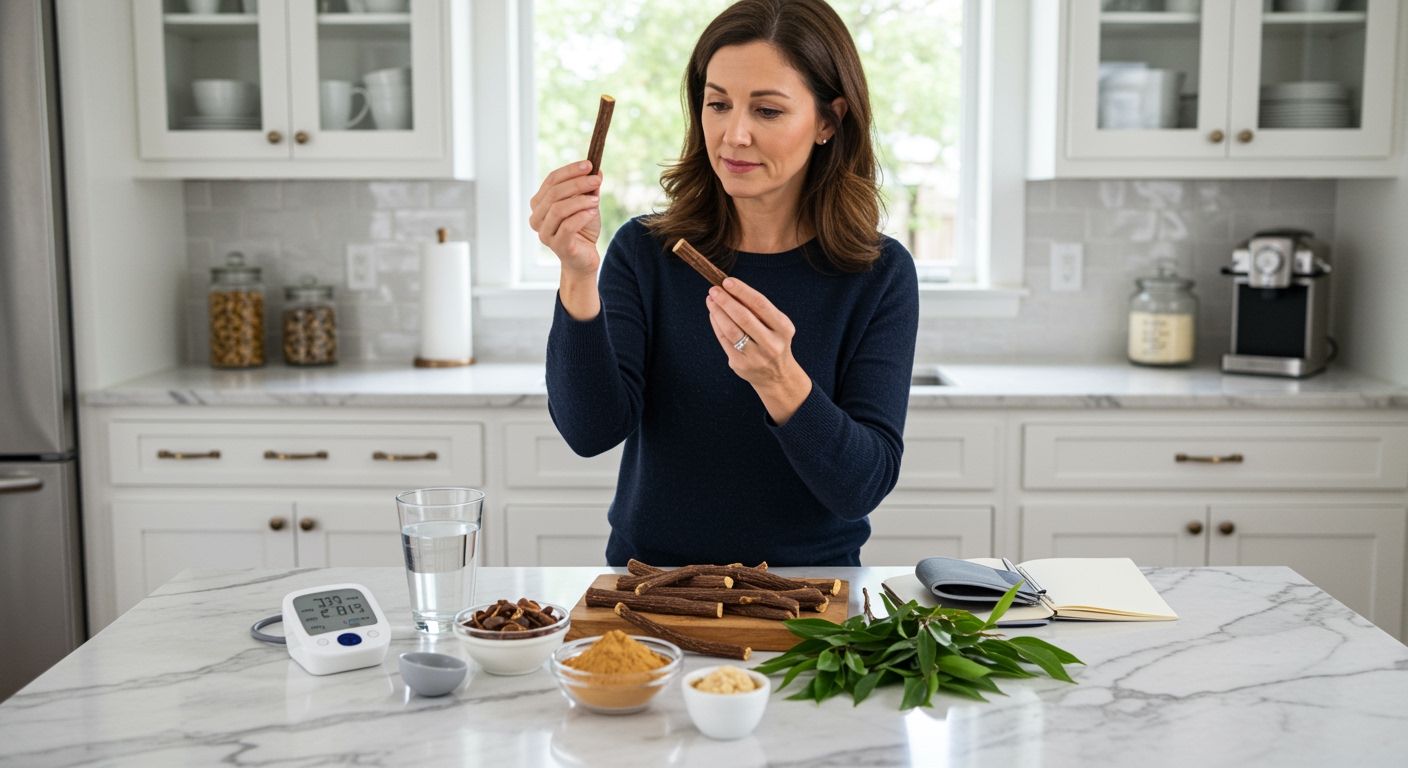✪ Key Takeaway: Licorice root can raise blood pressure but comes with serious risks that make it unsuitable for most people with hypotension.
Introduction
Your blood pressure reading shows numbers lower than normal and you wonder if that sweet licorice candy holds the secret to fixing your hypotension.
Many people with low blood pressure search for natural solutions because prescription medications often come with unwanted side effects that make daily life challenging.
Hi, I am Abdur, your nutrition coach and today I am going to explain whether licorice root can safely and effectively help raise your blood pressure levels.
How Does Licorice Root Affect Blood Pressure?
Licorice root contains a compound called glycyrrhizin that blocks an enzyme in your kidneys responsible for breaking down cortisol.
When this enzyme gets blocked, cortisol levels stay elevated in your body for longer periods than normal.
Higher cortisol levels cause your kidneys to retain more sodium and water while losing potassium through increased urination.
This sodium and water retention increases your blood volume, which naturally raises blood pressure throughout your circulatory system.
The mechanism works similarly to how your body responds to stress, but licorice root creates this effect artificially through dietary consumption.
Research shows that consuming as little as 50 grams of licorice candy daily can raise blood pressure within two weeks of regular use.
✪ Fact: Glycyrrhizin is 50 times sweeter than sugar, which explains why licorice tastes so intensely sweet.
What Are The Risks Of Using Licorice Root?
The same mechanism that raises blood pressure also creates dangerous electrolyte imbalances that can threaten your health.
Low potassium levels, called hypokalemia, can cause muscle weakness, fatigue, and irregular heart rhythms that may become life-threatening.
High sodium retention leads to fluid buildup in your tissues, causing swelling in your legs, ankles, and face.
Some people experience severe headaches, muscle cramps, and difficulty breathing when their electrolyte balance becomes severely disrupted.
The blood pressure increase from licorice root is often unpredictable and can overshoot your target range, creating hypertension instead of normal pressure.
People with kidney disease, heart conditions, or diabetes face even higher risks because their bodies cannot properly regulate these electrolyte changes.
✪ Note: The FDA warns against consuming more than 2 ounces of black licorice daily for people over 40.
Who Should Never Use Licorice Root?
Pregnant women should completely avoid licorice root because it can cause premature labor and harm fetal development.
People taking blood pressure medications risk dangerous interactions that can cause blood pressure to swing wildly between high and low levels.
Anyone with kidney disease cannot properly process the excess sodium and water retention that licorice root causes.
Heart patients face increased risks of arrhythmias and heart failure when their electrolyte balance becomes disrupted by glycyrrhizin.
Diabetics may experience worsened blood sugar control because elevated cortisol levels interfere with insulin sensitivity.
People over 65 years old have reduced kidney function that makes them more vulnerable to the toxic effects of excessive licorice consumption.
✪ Pro Tip: Always consult your doctor before trying any herbal remedy, especially if you take prescription medications.
What Are Better Alternatives For Low Blood Pressure?
Increasing your salt intake moderately provides a safer way to raise blood pressure without the dangerous side effects of licorice root.
Drinking more water throughout the day helps increase blood volume naturally without disrupting your electrolyte balance.
Eating smaller, more frequent meals prevents the blood pressure drops that often occur after large meals.
Wearing compression stockings helps improve blood circulation and prevents blood from pooling in your lower extremities.
Regular exercise strengthens your heart muscle and improves overall cardiovascular function without pharmaceutical intervention.
Getting up slowly from sitting or lying positions gives your body time to adjust and prevents sudden blood pressure drops.
✪ Fact: Drinking 16 ounces of water can temporarily raise blood pressure by 10-15 mmHg within 15 minutes.
The Bottom Line
Licorice root can indeed raise blood pressure, but the risks far outweigh any potential benefits for people with hypotension.
The safest remedy is often the simplest one, and natural approaches like proper hydration and gradual position changes work better than risky herbal interventions.
I would love to hear about your experiences with managing low blood pressure naturally, so please share your thoughts and questions in the comments below.
References
At NutritionCrown, we use quality and credible sources to ensure our content is accurate and trustworthy. Below are the sources referenced in creating this article:
- Restorative Medicine: Treating Adrenal Insufficiency and Hypotension with Glycyrrhiza
- American Heart Association: Black Licorice Is a Candy That Should Inspire Caution
- Healthline: Licorice Root: Benefits, Uses, Precautions, and Dosage
- University of Rochester Medical Center: Licorice





